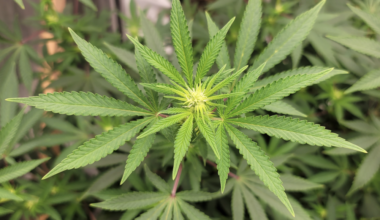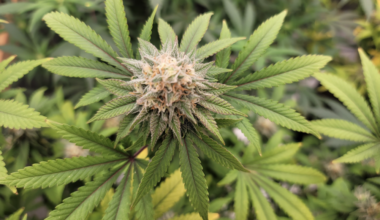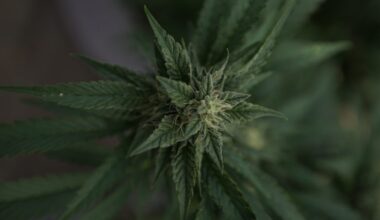A new congressional bill would make it so the punishment for military service members who use or possess marijuana could not exceed penalties for being drunk or incapacitated on duty.
Rep. Anthony Brown (D-MD) filed the Restoring Equity For Offenses Related to Marijuana (REFORM) Act last week. It would amend the Uniform Code of Military Justice (UCMJ) to more closely align cannabis- and alcohol- related penalties.
The text of the bill says that the penalty for “wrongful use of marijuana” shall not exceed that for being “drunk on duty” under existing statute.
Further, the penalty for “wrongful possession of marijuana” couldn’t exceed that for “incapacitation for duty from drunkenness or drug use.”
As it stands, the punishment for wrongful possession of up to 30 grams of cannabis carries a maximum penalty of “dishonorable discharge, forfeiture of all pay and allowances, and confinement for two years.” Possession of more than 30 grams can escalate that maximum confinement to five years.
In contrast, if a person’s use of alcohol renders them incapacitated for duty, they can face three months of confinement, or forfeiture of two-thirds of their pay ever month for three months. Being drunk on duty is more serious, carrying a maximum penalty of a bad conduct discharge, forfeiture of allowances and pay and confinement of up to nine months.
It should be pointed out that a bad conduct discharge is significantly less serious than a dishonorable discharge under UCMJ. The latter is considered to be the military equivalent of a felony convictions.
Brown’s REFORM Act seeks to reduce that marijuana and alcohol punishment disparity.
—
Marijuana Moment is already tracking more than 1,000 cannabis, psychedelics and drug policy bills in state legislatures and Congress this year. Patreon supporters pledging at least $25/month get access to our interactive maps, charts and hearing calendar so they don’t miss any developments.![]()
Learn more about our marijuana bill tracker and become a supporter on Patreon to get access.
—
“Equal justice and our efforts to ensure equity in our country cannot ignore the disproportionate toll cannabis prosecutions have on servicemembers of color,” Brown told Marijuana Moment. “Black servicemembers are disproportionately investigated and punished for drug-related offenses.”
“The current code is out of date and out of touch with the current reality in our country, especially when you consider that some of these servicemembers are enlisting from states where cannabis is legal,” he said.
Additionally, the bill would require military branches to annually report to congressional defense committees about drug testing and evaluation programs.
Those reports would need to include information about the number of drug tests that were administered, the number of positive tests, disaggregated by “statistical category and substance” and the resulting punishments for positive tests.
The reports would also need to include an “analysis of any disparities among race, gender, ethnicity, and military installation during the year covered by the report.”
Brown, a member of the House Armed Services Committee to which his new bill has been referred, separately worked to get report language attached to a large-scale defense spending bill that voiced concerns about racial disparities in military drug testing practices and ordered the Pentagon to conduct a review of the issue.
“The men and women of our armed forces defend our shared values,” the congressman said. “We need to ensure the military justice system is providing equal, unbiased justice for all. The REFORM Act is a critical step in those efforts.”
Separately, Rep. Ruben Gallego (D-AZ) has consistently tried to get legislation enacted to clarify that military branches can grant reenlistment waivers to service members who have committed a single low-level marijuana offense.
In any case, while cannabis is legal in some form in the majority of states across the U.S., the military has been especially inflexible about its cannabis policies, with service members even being precluded from using hemp-based products even though the crop was federally legalized under the 2018 Farm Bill.
Various branches have put out notices about their cannabis policies over the years to make it abundantly clear that serving in the military means the plant is off limits, regard of its legal status under state or federal law.
In 2019, the Department of Defense (DOD) announced a policy barring all active and reserve service members from using hemp products, including CBD. DOD more broadly reaffirmed that CBD is off limits to service members in earlier notices published in 2020.
About one year after hemp was federally legalized, the Air Force sent out a notice that similarly warned against using CBD products that are commonly found on the market. A Massachusetts base of the Air Force told pilots last year that they could face disciplinary action for possessing any type of hemp product, even if it’s “for your pet.”
Officials with the military branch also said the previous year that it wants its members to be extra careful around “grandma’s miracle sticky buns” that might contain marijuana.
The Navy, for its part, issued an initial notice in 2018 informing ranks that they’re barred from using CBD and hemp products no matter their legality. Then in 2020 it released an update explaining why it enacted the rule change.
The Naval War College has gone so far as to warn Sailors and Marines about new hemp products on the market, issuing a notice earlier this month that says members can drink a new Pepsi-owned Rockstar energy drink that contains hemp seed oil.
The Coast Guard said that sailors can’t use marijuana or visit state-legal dispensaries.
A factor that may have influenced these policy updates is that the Substance Abuse and Mental Health Services Administration released guidance to federal agency drug program coordinators in 2019 that outlined concerns about THC turning up in CBD products and causing failed drug tests. The agency issued an updated warning in 2020 after several more states voted to legalize marijuana.
Meanwhile, the U.S. Department of Veterans Affairs (VA) has separately faced criticism over its stance on cannabis issues.
Last month, for example, VA made clear that it won’t provide support for treatment involving marijuana as part of a new grants program aimed at preventing veteran suicide.
VA’s position on marijuana has been a source of consistent frustration for advocates and veteran service organizations who have been pushing for expanded research into the therapeutic potential of cannabis.
House and Senate committees held joint hearings last month to hear from veterans service organizations (VSOs) about how Congress and the federal government can better serve their constituents, and several of the groups brought up the need to ease restrictions on marijuana.
The testimony echoes what the VSOs have repeatedly raised with lawmakers. The specifics ranged in scope between the various groups, but the overall message was made clear: military veterans uniquely stand to benefit from marijuana treatment and it’s time for Congress to do something about it.
Separately, military veterans would be “encouraged” to discuss medical marijuana treatment without the fear of losing federal benefits under a recent bill being sponsored by Rep. Seth Moulton (D-MA). The main thrust of the legislation is to codify existing policies that allow VA doctors to talk about medical cannabis with patients as well as protections for veterans who are candid about their history with marijuana treatment. By doing so, it would enshrine these polices into law so that they could not later be changed administratively by future VA leaders.
Schumer’s Marijuana Legalization Bill Not Coming This Month, As Senators Work To Finalize Provisions
Photo courtesy of Martin Alonso.
Medical Disclaimer:
The information provided in these blog posts is intended for general informational and educational purposes only. It is not a substitute for professional medical advice, diagnosis, or treatment. Always seek the advice of your physician or other qualified healthcare provider with any questions you may have regarding a medical condition. The use of any information provided in these blog posts is solely at your own risk. The authors and the website do not recommend or endorse any specific products, treatments, or procedures mentioned. Reliance on any information in these blog posts is solely at your own discretion.







